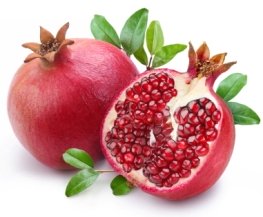Resveratrol

Resveratrol is a powerful anti-oxidant found in red wine, Japanese knotweed (polygonum cuspidatum), skin of red grapes, blueberries, bilberries, cranberries, raspberries, jackfruit, pomegranate, peanuts and cocoa.
It is generally produced by plants as a response to fungal or bacterial attack and is a natural antibiotic and fungicide.
It has been observed that French people have a relatively low incidence of coronary heart disease, despite having a diet high in saturated fat. It is thought that this anti-oxidant is responsibe for this 'French paradox'.
Wines, particularly red wines, are a source but Dr Johan Auwerx of the Institute of Genetics and Molecular and Cell Biology in Illkirch, France, says that "You definitely need higher concentrations than you get from red wine".
It has been shown to control inflammation, proven effective at lowering sugar in the blood, is good for the heart and has also been shown to have many anti-cancer properties.
It occurs in two forms, trans- and cis-. The one used in clinical studies that also seems to have the most potential for promoting health is Trans-resveratrol.
It is a potent anti-oxidant (about 20-50 times as effective as vitamin C). Originally it was thought that it targeted the sirtuin1 (Sirt1) gene which is associated with longevity but recently this was found not to be the case but it may indirectly increase Sirt 1 activity. It inhibits certain types of proteins known as phosphodiesterases (PDEs), enzymes that help regulate cell energy.
Some researchers see its potential benefits as a "fountain of youth."
The research on this antioxidant is still in its infancy and only a few human trials have been completed yet (as at June 2012) but the research is certainly promising. Even Quackwatch was generally positive about the studies but gave the reasonable warning that ‘only human clinical trials can determine whether supplementation is useful for humans. [It] has not been tested in clinical trials' [although some trials have been completed and others are now in process].
Also, even though one researcher, Dipak Das, controversially, faked some of his research there is a large body of work that has demonstrated various beneficial effects of Resveratrol on everything from yeast to worms to flies to fish to mice to monkeys and also in trials being conducted on humans.
Until we get more human clinical trial results in we are mainly left with anecdotal evidence which is basically the experience of humans who have tried it in its various forms. Much of that feedback has been positive.
Below I outline some of the
benefits and background.

Life extension
One aspect of extending lifespan is preventing the damage done by free radicals. Free radicals are molecules missing an electron and in seeking to replace that electron free radicals cause damage to the cells of the body, but once rendered stable they become harmless. Resveratrol is able to give electrons to free radicals that are unstable in the body , but still remain stable itself, making it one of the best natural antioxidants.
Professor David Sinclair, a researcher at the Harvard Medical School in Boston, Massachusetts said that it is the first compound known "that has extended the lifespan of every organism given it".
It appears that it can induce the expression of several longevity genes including Sirt1, Sirt3, Sirt4, FoxO1, Foxo3a and PBEF and prevent aging-related decline in cardiovascular function including cholesterol level and inflammatory response.
In a study on short-lived fish, Valenzano et al.(Current Biology 16, 296–300, 2006) added it to their fish food starting in early adulthood and caused a dose-dependent increase of median and maximum lifespan. In addition, it delayed the age-dependent decay of locomotor activity and cognitive performances and reduces the expression of neurofibrillary degeneration in the brain.
These
results demonstrate that food supplementation with it prolongs
lifespan and retards the expression of age-dependent traits in fish.

Cancer
In a study done in vitro (which
basically means in a test tube or in a laboratory) it proved to be effective at
helping to eliminate the cells of prostate cancer, breast cancer, esophageal cancer, cancer
of the cervix, ovarian cancer, skin cancer, lung cancer, and others as well. Not
only did it kill cancer cells and protect healthy cells but also prevented the
formation of cancer cells.
Dr Arthur Polans, a
professor at the University of Wisconsin School of Medicine and Public Health,
has demonstrated in mice that it shrinks tumors and kills malignant cells in
five types of cancer: skin melanoma, breast cancer, neuroblastoma, ocular melanoma
and retino-blastoma. It appears to have the ability to kill cancer kills while
leaving healthy tissue alone.
Prostrate cancer - In one study
resveratrol-fed mice showed an 87 percent reduction in their risk of developing
prostate tumors that contained the worst kind of cancer-staging diagnosis. The
mice that proved to have the highest cancer-protection effect earned it after
seven months of consuming it in a powdered formula mixed with their food.
Other mice in the study, those fed resveratrol but still developed a
less-serious form of prostate cancer, were 48 percent more likely to have their
tumor growth halted or slowed when compared to mice who did not consume the
compound, the research team said. This study adds to a growing body of evidence
that this antioxidant has powerful chemoprevention properties.
Breast cancer - A study
published in May, 2006 found that resveratrol-fed female mice had a considerable
reduction in their risk of breast cancer. It seems to stop breast cancer cells from growing by blocking the growth effects of
estrogen.
Colon cancer - Not only
did it help to fight the spread of free radicals in the body, but it helped to
inhibit the growth of tumors in the colon by blocking the main enzyme
considered to be responsible for colon cancer: That enzyme is known as Cox-2.
Skin cancer- According
to researchers at the Herbert Irving Dermatology
Centre "Resveratrol is very effective at blocking DNA damage induced by
ultraviolet-B (UVB) light, which is the most important risk factor for skin
cancer,” and “When UVB light hits skin cells, it can damage the DNA. If there’s
enough damage over time, the cells can become cancerous". The scientists
wanted to find out if resveratrol could prevent or reverse adverse effects
resulting from those genetic changes.”
The results are promising. In one experiment, mice were given regular doses of
an oral solution and chronically exposed to UVB light. “We saw a 70-percent
reduction in non-melanoma skin tumors in the treated mice, compared to a
control group”, Lead researcher, Dr. Kim reports.
Blood Pressure
Studies performed at the Mayo Clinic with mice indicated that Resveratrol may help to prevent damage to blood vessels and reduce inflammation along with bad LDL cholesterol and also minimise blood platelets from clumping together. All of these conditions can block the arteries and cause blood pressure to rise. It also makes blood vessels more flexible so blood can flow without resistance and helps with circulation. All of these effects combined helps lower blood pressure.
Bodybuilding
It seems
that a growing body of evidence suggests that resveratrol may have a role in
bodybuilding. High levels of oestrogen can contribute to muscle loss and fat
gain but resveratrol may act as a natural oestrogen blocker (Lu & Serrero
1999).
It also appears to increase NO synthesis and bioavailability and may be useful
in achieving a ‘shredded’ look because of its ability to increase the amount of
fat burned (Timmers et al 2011).
Since it is a powerful antioxidant it has the potential to aid in recovery
post-workout and protect against free radical damage during intense workouts
and a 2008 study revealed that resveratrol has a ‘positive effect on male
reproductive function by enhancing blood testosterone levels'.

Diabetes
Diabetes mellitus affects approximately 20 million people in the US, or nearly 7% of the population. It is expected to increase by 70% within the next 25 years and numerous epidemiologic studies have demonstrated that type 2 diabetes increases the risk of cardiovascular morbidity and mortality. It is estimated to cost over $92 BILLION in health care costs and lost productivity.
An accumulation of evidence demonstrates the possible benefits of resveratrol in diabetes and diabetic complications. It is already known that it affects insulin secretion and blood insulin concentration.
In animals with hyperinsulinemia, it reduces blood
insulin and numerous data indicate that in diabetic rats, it is able to reduce
hyperglycemia. In diabetics the high production of glucose causes cellular damage to the blood vessels. Current research theorises that
resveratrol can protect against this damage by assisting cells to make protective enzymes.
A recent study (April, 2012) about to be published in the journal Diabetes Research and Clinical Practice found that it can protect the islets that produce Beta cells (which produce insulin), in mice from abnormal insulin secretion and morphological changes induced by a high-fat diet. But what about humans?
Recently a small, pilot study involving ten people, diagnosed with impaired glucose tolerance was conducted. The group, aged 69 to 75, were given a moderate dose supplement of resveratrol for four weeks.
The results, published in the Journal of Gerontology, showed significant improvements in insulin sensitivity and reduced post-meal glucose levels. Their conclusion was that ‘At doses between 1 and 2 g/day, it improves insulin sensitivity and post-meal plasma glucose in subjects with Impaired Glucose Tolerance’.
In 2011, a study published in the British Journal of Nutrition found that a four-week intervention with it in type 2 diabetic men significantly improved insulin sensitivity.
Supplementing trans-resveratrol twice daily at a dose of 5 mg decreased insulin resistance, lowered blood glucose levels and delayed the glucose peak following a standardized meal in type 2 diabetic men.
According to a report in the ‘Annals of the New York Academy of Sciences’ ‘It seems quite possible that resveratrol, alone or in combination with current anti-diabetic therapies, will be used in preventing and treating diabetes’
Anti-inflamatory (e.g. arthritis)
In a study published in the journal 'Inflammation' looking at an experimental rabbit inflammatory arthritis model, resveratrol showed promise as a potential therapy for arthritis. When administered to rabbits with induced inflammatory arthritis, it protected cartilage against the progression of inflammatory arthritis.
Another study, published in
'Rheumatology' journal in 2008 showed that it reduces cartilage damage and synovial
lining inflammation in rheumatoid arthritis. A recent study (2012) in 'Rheumatology International' suggests that it can suppress hyperplasia of synovial cells, a critical factor in rheumatoid arthritis and has potential as an anti-arthritis treatment.
Toxicity
The few clinical trials done to date seem to indicate that it is not toxic and does not cause adverse effects in people but it may be precautionary for pregnant women and children not to consume it. A small study from 2007 found a single dose of up to 5 g caused no serious adverse effects in healthy volunteers.
However, doses higher than 100 mg per day may increase the risk of bleeding in individuals who also use anticoagulant drugs, such as warfarin or its analogues.
It has also
been shown that resveratrol can exhibit pro-oxidant properties, leading to
oxidative breakage of cellular DNA but higher doses than 100mg are probably not necessary in humans anyway unless you have a specific condition that requires more.
leave Resveratrol page and return to Home page